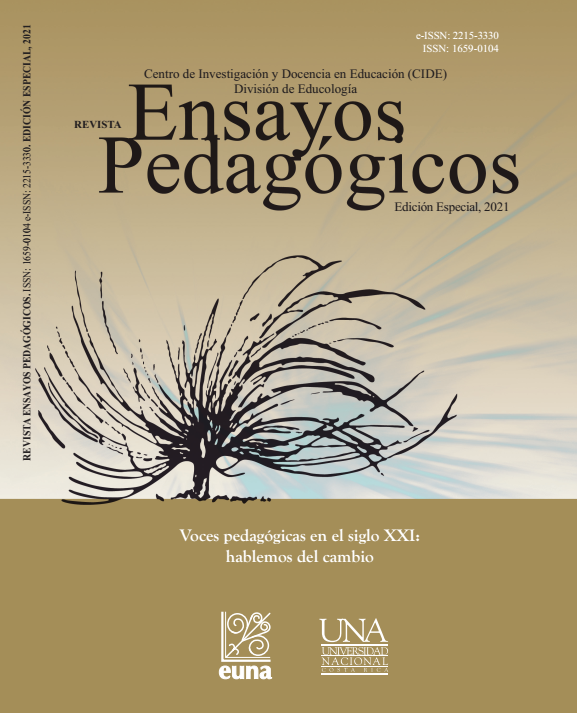The Impact of Globalization on Higher Education of the 21st Century. Changes in the Social Imaginary of Educational Communities
DOI:
https://doi.org/10.15359/rep.esp-21.6Keywords:
globalization, neoliberalism, social imaginary, educational communities, higher education, teaching and learningAbstract
In this paper, a reflexive assessment of the shifts in the social imaginary of the educational communities in higher education of the 21st century generated by the process of globalization in its neoliberal juncture is made. To achieve this endeavour, a contextual discourse analysis about the effects of globalization on international and domestic levels has been carried out in order to deepen on the dynamics and the opportunities to raise awareness of the implications of this type of manifestations. In addition, this analysis aims to take into account the needs of the students of the future generations and works to open the possible scenarios as spaces to transform the teaching and learning process.
References
Apple, M. (2001). Política cultural y educación. Ediciones Morata
Blanco Súarez, J., Duarte Romero, L y Aragón Salazar, M. (2017). Neoliberalismo y escuela. Transformaciones de la escuela a partir de las políticas neoliberales en Colombia. Revista Republicana, 23, 93-128. http://dx.doi.org/10.21017/Rev.Repub.2017.v23.a32
Castells, M. (2001). La ciudad de la nueva economía. Papeles de población, 7 (27), 207-221. http://www.redalyc.org/pdf/112/11202708.pdf
Escárcega, R. (2014). Pedagogía tradicional y pedagogía crítica. Doble Hélice Ediciones-Instituto Latinoamericano de Pedagogía Crítica.
Escuela de Ciencias de la Computación e Informática. (s. f.). Historia del desarrollo de la carrera en la Universidad de Costa Rica. https://www.ecci.ucr.ac.cr/%C2%BFqui%C3%A9nes-somos/historia
Estado de la Nación. (2011). Tercer Informe Estado de la Educación. http://hdl.handle.net/20.500.12337/675
Ferrer, A. (2013). La importancia de las ideas propias sobre el desarrollo y la globalización. Problemas del desarrollo, 173(44), 163-174. http://dx.doi.org/10.1016/S0301-7036(13)71879-0
Gurdián, A. (2010). “Al Toro por los cuernos...”: Crisis es riesgo y oportunidad. Revista Actualidades Investigativas en Educación 10, 1-15. http://dx.doi.org/10.15517/aie.v10i4.10158
Huerta, M. (2005). El neoliberalismo y la conformación del Estado subsidiario. Política y Cultura, 24, 121-150. http://www.scielo.org.mx/scielo.php?script=sci_arttext&pid=S0188-77422005000200006
Lander, E. (Comp.) (2000). La colonialidad del saber, eurocentrismo y ciencias sociales. Perspectivas latinoamericanas. CLACSO.
Núñez, B. (1974). Hacia la universidad necesaria. https://documentos.una.ac.cr/bitstream/handle/unadocs/5972/hacia%20la%20Universidad%20Necesaria.pdf?sequence=1&isAllowed=y
Pascual, R y Ghiotto, L. (2010). Reconceptualizando lo político: Estado, mercado mundial, globalización y neoliberalismo. Nueva Época, 23(64), 133-162. http://www.scielo.org.mx/scielo.php?script=sci_arttext&pid=S0187-57952010000300006
Rama, C. (2017). La evolución de la educación superior. En M. Román, V. Lentini y Y. Thyme (Eds.), La reforma de la calidad: Estructuras, dinámicas y debilidades del aseguramiento de la calidad de la educación superior en América Latina y el Caribe (pp. 1-69). Programa Estado de la Nación.
Sánchez, P. y Rodríguez, J. (2011). Globalización y educación: Repercusiones el fenómeno en los estudiantes y alternativas frente al mismo. Revista Iberoamericana de Educación, 54,1-12. https://doi.org/10.35362/rie5451653
Sánchez, J. y Zaldívar, M. (2015). La responsabilidad social como respuesta a los efectos de la globalización y el neoliberalismo. Revista ECA Sinergia, 7(2), 142-149. http://oaji.net/articles/2017/5813-1516137834.pdf
Solano, J. (2018). Las narrativas del desarrollo en América Latina y la nueva gramática social del capitalismo tardío. Letra Maya.
Streck, R., Redin, E, y Zitkoski, J. (2015). Diccionario Paulo Freire. CEAAL.
Torres, J. (2001). Educación en tiempos de neoliberalismo. Editorial Morata.
Published
How to Cite
Issue
Section
License
Ensayos Pedagógicos is subscribed to the Attribution-NonCommertial-NoDerivatives 4.0 International Creative Commons Licence, which allows both authors and readers to freely download, store, copy, and distribute the final approved publisehd version of the manuscript (post-print) as long as this is done without commercial purposes, no derivative works are generated, and the source and author are mentioned. As well, Ensayos Pedagógicos declares that authors will remain the rightful owners of the copyrights of their work in perpetuity.







